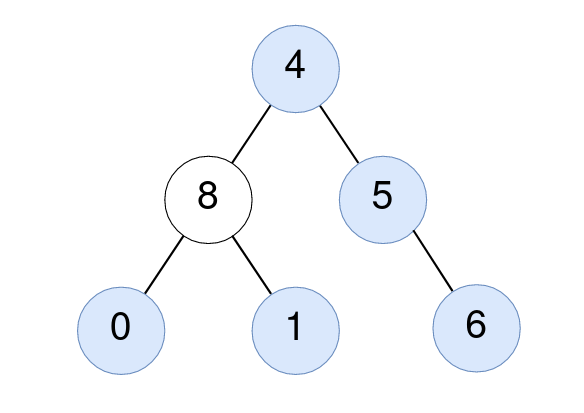Problem
Given the root of a binary tree, return **the number of nodes where the value of the node is equal to the *average* of the values in its subtree**.
Note:
The average of
nelements is the sum of thenelements divided bynand rounded down to the nearest integer.A subtree of
rootis a tree consisting ofrootand all of its descendants.
Example 1:

Input: root = [4,8,5,0,1,null,6]
Output: 5
Explanation:
For the node with value 4: The average of its subtree is (4 + 8 + 5 + 0 + 1 + 6) / 6 = 24 / 6 = 4.
For the node with value 5: The average of its subtree is (5 + 6) / 2 = 11 / 2 = 5.
For the node with value 0: The average of its subtree is 0 / 1 = 0.
For the node with value 1: The average of its subtree is 1 / 1 = 1.
For the node with value 6: The average of its subtree is 6 / 1 = 6.
Example 2:

Input: root = [1]
Output: 1
Explanation: For the node with value 1: The average of its subtree is 1 / 1 = 1.
Constraints:
The number of nodes in the tree is in the range
[1, 1000].0 <= Node.val <= 1000
Solution (Java)
/**
* Definition for a binary tree node.
* public class TreeNode {
* int val;
* TreeNode left;
* TreeNode right;
* TreeNode() {}
* TreeNode(int val) { this.val = val; }
* TreeNode(int val, TreeNode left, TreeNode right) {
* this.val = val;
* this.left = left;
* this.right = right;
* }
* }
*/
class Solution {
private int ans = 0;
public int averageOfSubtree(TreeNode root) {
dfs(root);
return ans;
}
private int[] dfs(TreeNode node) {
if (node == null) {
return new int[] {0, 0};
}
int[] left = dfs(node.left);
int[] right = dfs(node.right);
int currsum = left[0] + right[0] + node.val;
int currcount = left[1] + right[1] + 1;
if (currsum / currcount == node.val) {
++ans;
}
return new int[] {currsum, currcount};
}
}
Explain:
nope.
Complexity:
- Time complexity : O(n).
- Space complexity : O(n).